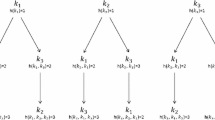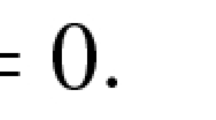Abstract
We consider allocation problems with indivisible goods when agents’ preferences are single-peaked. We propose natural rules (called up methods) to solve such a class of problems and axiomatically characterize them. We also prove that these methods can be interpreted as extensions to the indivisible case of the so-called equal distance rule.
Similar content being viewed by others
References
Ching S (1994) An alternative characterization of the uniform rule. Soc Choice Welf 11:131–136
Chun Y (1999) Equivalence of axioms for bankruptcy problems. Int J Game Theory 28:511–520
Herrero C (1999) Individual rights and collective responsibility: the rights-egalitarian solution. Math Soc Sci 37:59–77
Herrero C, Martínez R (2006) Allocation problems with indivisibilities when preferences are single-peaked. Mimeo
Herrero C, Martínez R (2008) Balanced allocation methods for claims problems with indivisibilities. Soc Choice Welf 30:603–617
Herrero C, Villar A (1999). The equal distance rule in allocation problems with single-peaked preferences. In: Current trends in economics: theory and practice. Springer, Berlin, pp 215–223
Herrero C, Villar A (2000) An alternative characterization of the equal-distance rule for allocations problems with single-peaked preferences. Econ Lett 66:311–317
Herrero C, Villar A (2001) The three musketeers: four classical solutions to bankruptcy problems. Math Soc Sci, 42:307–328
Herrero C, Villar A (2002) Sustainability in bankruptcy problems. Top 10:261–273
Hokari T, Thomson W (2004) On properties of division rules lifted by bilateral consistency. Mimeo
Moulin H, Stong R (2002) Fair queuing and other probabilistic allocation methods. Math Oper Res 27:1–30
Sprumont Y (1991) The division problem with single-peaked preferences: A characterization of the uniform allocation rule. Econometrica 59:509–519
Thomson W (1994) Consistent solutions to the problem of fair division when preferences are single-peaked. J Econ Theory 63:219–245
Thomson W (1995) Population-monotonic solutions to the problem of fair division when preferences are single-peaked. Econ Theory 5:229–246
Thomson W (1998) Consistency and its converse: an introduction. Rochester Cent Econ Res 448
Yeh C-H (2004) Sustainability, exemption, and the constrained equal awards rule: a note. Math Soc Sci 47:103–110
Yeh C-H (2006) Protective properties and the constrained equal awards rule for claims problems: a note. Soc Choice Welf 27:221–230
Young HP (1994) Equity: theory and practice. Princeton University Press, Princeton
Author information
Authors and Affiliations
Corresponding author
Rights and permissions
About this article
Cite this article
Herrero, C., Martínez, R. Up methods in the allocation of indivisibilities when preferences are single-peaked. TOP 16, 272–283 (2008). https://doi.org/10.1007/s11750-008-0043-6
Received:
Accepted:
Published:
Issue Date:
DOI: https://doi.org/10.1007/s11750-008-0043-6




